"All to fight with Kolchak!"
General situation at the front
In early March, the 1919 of the year, anticipating the Reds, who were also preparing for an offensive, the white armies of Kolchak launched Flight to the Volga, a strategic operation aimed at defeating the Red Eastern Front, access to the Volga, connecting with the White Northern Front and further march on Moscow ("How did the" Flight to the Volga "; "How Kolchak's army broke through to the Volga").
Initially, Kolchak’s strategy repeated the plans of his predecessors, the White Czechs and the Directory. They planned to deliver the main blow in the northern operational direction, Perm - Vyatka - Vologda. A strike in this direction, with success, led to a connection with the troops of the Whites and the interventionists on the Northern Front. Then it was possible to organize a campaign against Petrograd, having received help from Finland and the Northern Corps in this strategic operation (since the summer of the 1919, the North-Western Army). The northern direction as a whole was a dead end, since the western interventionists were not really going to fight in Russia, acting with the hands of whites and nationalists, there were few communications here, the territories are poorly developed economically, there is little population.
At the same time, the white command delivered a strong blow to the line of the middle Volga, approximately at the front of Kazan, Simbirsk. This direction was more important, as it allowed to force the Volga, leading the whites to rich in material resources and densely populated gubernias. Kolchak's army brought together with the White South Front. The White Eastern Front struck out in three armies: The Siberian army, under the command of General Gaida, attacked the Permian-Vyatka sector; The Western army of General Khanzhin struck at Ufa (the Southern Army group was allocated on its southern flank); The Orenburg and Ural armies advanced on Orenburg and Uralsk. Kappel's case was in reserve. Thus, the main forces of the Russian army of Kolchak (93 thousand people from 113 thousand) were advancing in the Vyatka, Sarapul and Ufa directions.
The forces of whites and reds at the beginning of the battle were about equal. The troops of the Red Eastern Front numbered 111 thousand people, had the advantage in firepower (guns, machine guns). During the first stage of the operation, White was helped by the fact that in the central, Ufa direction there was a weak 10-thousandth 5-I Red Army. Against her, there was a strong 49-thousandth white Hanzhin group. In the north (the 2 and 3 Red armies) forces were approximately equal, in the south the Red forces had a strong army group (4, Turkestan and 1 armies).
The moment for the strategic offensive of Kolchak's army was favorable. The military coup that brought Kolchak to power temporarily strengthened the internal unity of the whites. Internal contradictions at the time were smoothed out. Kolchak mobilized in Siberia, supplies were restored, the army was at the peak of its combat capability. The Russian army Kolchak provided material assistance to the United States, Britain, France and Japan. The Soviet command transferred part of the forces of the Eastern Front to the Southern, where the situation was extremely tense. The policy of "war communism", especially the food distribution, caused the growth of peasant uprisings in the rear of the Reds. In the near rear of the Eastern Front of the Red Army a wave of uprisings swept through Simbirsk and Kazan provinces.
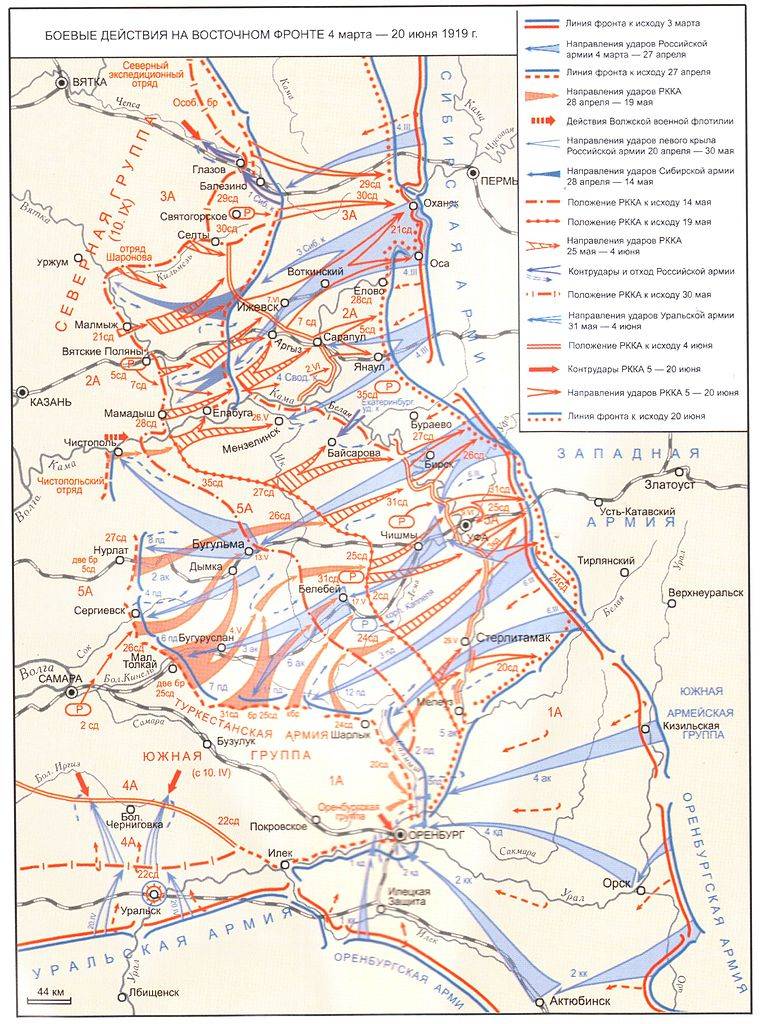
The breakthrough of the army of Kolchak to the Volga
White's offensive began on 4 March 1919 of the year. The Siberian army of Gaydy struck in the area between the cities of Osa and Okhansk. The Whites forced the Kama across the ice, took both cities and developed the offensive. Guyda’s army was able to advance to 90 - 100 km in a week, but it was not possible to break through the front of the Reds. White's further advance was slowed down by the enormous space of the theater, the lack of roads and the resistance of the Reds. While retreating, the 2-I and 3-I red armies retained the integrity of the front and combat capability, although they suffered casualties and great material damage. After the defeat in the Perm region, the Reds carried out work on mistakes (the Stalin-Dzerzhinsky commission), quantitatively and qualitatively strengthened the direction, increased the combat capability of the troops.
Whites occupied a large region, 7 of April was again established in Izhevsk-Votkinsky district, 9 of April captured Sarapul and 15 of April their forward units in the wild Pechora region came into contact with groups of the white Northern front. However, this event, as previously noted, had no strategic significance. In the second half of April, 1919, the Siberian army of Gaida did not have great success, and the resistance of the 3 th Red Army increased. However, on the left flank, White pressed the Reds and threw the right flank of the 2 Red Army over the lower course of the river. Vyatka.
In the central direction Kolchak's army achieved greater success. The strike group of Khanzhin’s Western Army (it was one of Kolchak’s best commanders) found the enemy’s weak spot and attacked the 5 and 2 armies in the free space between the inner flanks. The left-flank brigade of the 5 Army (from the 27 Division) was defeated, the whites moved along the Birsk-Ufa highway to the rear of both divisions of the Red Army (26 and 27). During the 4-day battles, the 5 Army was defeated, its remnants retreated in the Menzeline and Bugulma areas. March 13 whites took Ufa, captured large trophies.
The introduction of private reserves into the battle and the Reds' attempt to organize a counterstrike on the left flank of the 1 Army in the Sterlitamak area did not lead to success. True, the remnants of the 5 th Red Army managed to avoid encirclement and total annihilation. The Reds retreated to Simbirsk and Samara. White continued the breakthrough. April 5 Kolchakians took Sterlitamak and Menzelinsk, April 6 - Belebey, April 13 - Bugulma, April 15 - Buguruslan. April 21 whites came to Kama in the area of today's Naberezhnye Chelny, created a threat to Chistopol. April 25 took Chistopol, creating a threat of a breakthrough to Kazan. In the south, the armies of the Orenburg and Ural Cossacks took Orsk, Lbishchensk, laid siege to Uralsk, and approached Orenburg.
Thus, the strike of Khanzhin's army led to a strategic breakthrough of the central sector of the Red Eastern Front. However, this event did not lead to the collapse of the entire Eastern Front of the Red Army, which could lead to the catastrophe of the Southern Red Front. This was due to the scale of the theater, no matter how deep the breakthrough of Kolchak was, it did not affect the situation in the northern and southern directions of the Eastern Front. This made it possible for the supreme Soviet command to undertake a series of retaliatory measures for the transfer of reserves, new units to the threatened direction, and to prepare a powerful counterattack. In addition, the white command simply did not have second-tier troops and strategic reserves to build on the success of the Ufa-Samara and Kazan directions. From other directions, White could not transfer forces. The Siberian army of Gayda was distracted in the unpromising direction of Vyatka, and in the south the Cossack divisions were bogged down in Orenburg and Uralsk.
As a result, at the end of April 1919, the Russian Army of Kolchak broke through the front of the Eastern Red Front, captured vast territories with a population of more than 5 million. The White Eastern Front established contact with the Northern Front. Kolchak's deputies reached distant approaches to Kazan, Samara and Simbirsk, and besieged Orenburg and Uralsk.
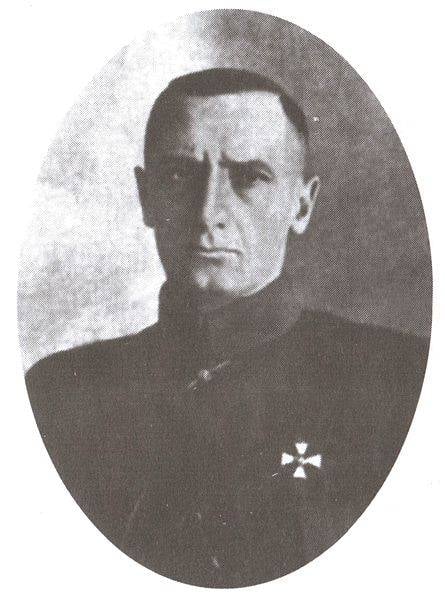
On the reasons for the failure of the further advance of Kolchak's armies
The enormous scope of the strategic operation and the determination of the goals of the Kolchak army ruled out the possibility of achieving victory in one stage by the available forces. That is, after the exhaustion of the forces of the shock groups of the Siberian and Western armies, new mobilizations were required. And they were at the expense of the Siberian peasantry. However, the policy of the Kolchak government precluded the possibility of finding a common language with the Russian peasantry. As already noted in a series of articles on the Troubles and the Civil War in Russia, the peasants, since the February Revolution and the authorities of the Provisional Government, waged their war. The struggle against any government in general, not wanting to pay taxes, go to war in the army of whites or reds, fulfill labor duties, etc. The peasant war against any government has become one of the brightest and bloody pages of the Russian Troubles. It is clear that the peasants did not intend to support the regime of Kolchak, who led the policy of enslaving them.
Therefore, new mobilization of peasants for the army only strengthened the resistance of the peasantry, worsened the position of Kolchak's army. The movement of the red partisans spread in the rear, the peasants raised one rebellion after the others, the tough repressive policies of the Kolchak government could not rectify the situation. Suppress a riot in one place, a fire breaks out in another. At the front, new recruits only decomposed the troops. It is not surprising that when the Reds launched a counterattack, many white units began to completely go over to the side of the Red Army.
That is, whites did not have a serious social base in the east of the country. The peasantry opposed the Kolchak regime, became the mainstay of the red partisans. The townspeople were generally neutral. The workers were split. Izhevtsy and Votkinsk fought for the whites, others supported the Reds. The Cossacks were small, rather weak (relative to the Don, Kuban, and Terek Cossacks), and disunited. Amur and Ussuri Cossack troops bogged down in the internal war of Primorye. The leader there was the ataman Kalmykov, an outspoken thug who ignored Kolchak's government and was oriented toward Japan. His people were more involved in looting, murder, and violence than fighting the Reds. The larger army of Zabaikalsky was subordinate to ataman Semyonov, who also did not recognize the power of Kolchak and looked at Japan. It was beneficial for the Japanese to support the Ataman “governments” of Kalmykov and Semenov, they hoped to create puppet state formations in the Far East and Eastern Siberia completely dependent on the Japanese Empire on the basis of them. In this muddy water, the Japanese quietly robbed the wealth of Russia. At the same time, the power of the atamans was frankly gangster; Semyonov, even against the backdrop of the horrors of the Troubles, was distinguished by the craziest antics, the most brutal murders and terror. Atamans and their henchmen slaughtered, hung, tortured, raped and robbed all who could not offer strong resistance, created "initial capital" to live comfortably abroad. In addition, some of the Cossacks recoiled from such outspoken gangsters, created red squads and fought against Semyonov.
More or less, Kolchak's regime was supported by the Siberian Cossacks. Semirechye Cossacks fought their war, on the outskirts of the empire. The Orenburg Cossacks were quite powerful. True, there were red Cossacks. Cossacks submitting to Dutov became part of Kolchak's Russian army. The Orenburg army led an offensive in the southern direction. However, the Orenburg Cossacks as a whole fought on their own, their connection with them was weak. The situation was similar with the Ural Cossacks.
Also, Kolchak's army did not have a serious qualitative advantage over the Red Army, unlike Denikin’s Armed Forces of the South of Russia. The main part of the officership during the collapse of the country and the beginning of unrest rushed to the south of the country. In addition, since the uprising of the Czechoslovak Corps, getting to the south from the center of Russia was much easier than to Siberia through the front. Many then went over to the side of the Reds or, until the last, tried to maintain neutrality, tired of the war. But having a base allowed Alekseev, Kornilov and Denikin to create a powerful personnel core of the army. Get the "nominal" selected officer parts - Markov, Drozdov, Kornilov, Alekseev, welded by traditions, victories and defeats. Kolchak had practically no such parts. The people of Izhevsk and the workers of Votkinsk from the rebel workers themselves became strong and combat-ready units. In the east, frames were most often random or mobilized. Of the 17 thousand officers, only about 1 thousand were personnel officers. The rest, at best, are storekeepers, warrant warrant officers, and at worst, “officers” produced by various foundations, directories and regional governments. The acute shortage of personnel forced the officers to produce as officers after six-week courses.
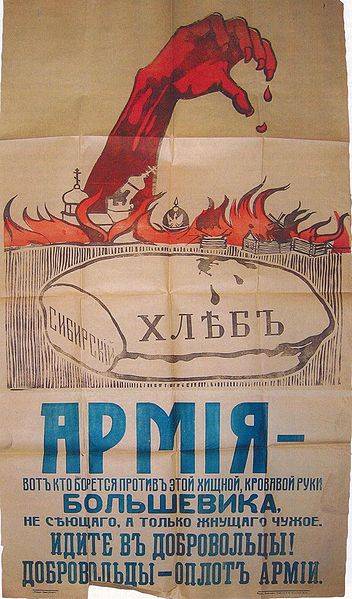
The situation was similar with the military leaders. In the south of Russia, a whole galaxy of famous commanders, many of whom distinguished themselves during the world war, came to the fore. Prominent commanders were so many that they did not have enough troops. They had to be held in civilian positions and in reserve. In the south, there was a shortage of experienced, competent, and talented personnel. This led to the weakness of the White Front headquarters, a shortage of experienced commanders at army, corps and divisional levels. It was full of all sorts of adventurers, careerists, people who want to fill their pockets in the surrounding chaos. Kolchak himself admitted: “... we are poor in people, why we have to endure even in high posts, not excluding ministers, people far from appropriate for the places they occupy, but this is because there is no one to replace them ...”
In this position, the white command could count on the success of one powerful strike. It was necessary to choose one operational direction, on the other to confine to auxiliary operations. It was advisable to strike the main blow south of Ufa, in order to join forces with the Southern White Front. However, apparently, the government of Kolchak was bound by obligations to the Entente. As a result, the White Army inflicted two heavy blows on Vyatka, in the region of the Middle Volga. This led to the dispersal of White’s limited forces and assets.
It is not surprising that already against the background of victories, problems quickly began to accumulate. A separate Orenburg army Dutov approached Orenburg and got bogged down under it. Cossack cavalry was unsuitable for the siege and the assault of fortified positions. And the Cossacks did not want to go around Orenburg, to go into a deep breakthrough, they wanted to first liberate "their" land. The Ural Cossacks were bound by the siege of Uralsk. The Orenburg sector was automatically attached to Khanzhin’s Western Army. The southern army group Belova was pulled to cover the front gap between the Western army and the Orenburg and Ural armies. As a result, the whites lost their advantage in cavalry. Instead of entering the breach created by Khanzhin’s powerful offensive, smashing the reds of the Reds, their separate units, intercepting communications, all the cavalry forces of the White Army were tied for Orenburg and Uralsk.
Meanwhile, the Khanzhin corps were moving farther and farther apart from each other across the vast expanses of Russia, losing a weak link between them. White command could still strengthen the Western army at the expense of the Siberian. However, this possibility Kolchak headquarters did not use. And the red ones did not sleep. Pull up reserves, new parts, mobilized the Communists, strengthening the personnel of the Eastern Front.
In addition, in the middle of April 1919, the spring thaw began, flooding the rivers. The dash on Samara was drowned in mud. Gadgets and artillery far behind the advanced units. White troops were cut off from their bases; they could not replenish their reserves at the decisive moment. weapons, ammunition, ammunition, provisions. The movement of troops stopped. Red troops were in the same position, but for them it was a useful pause in the fighting. They were at their bases, could replenish troops, stocks, rest and regroup.
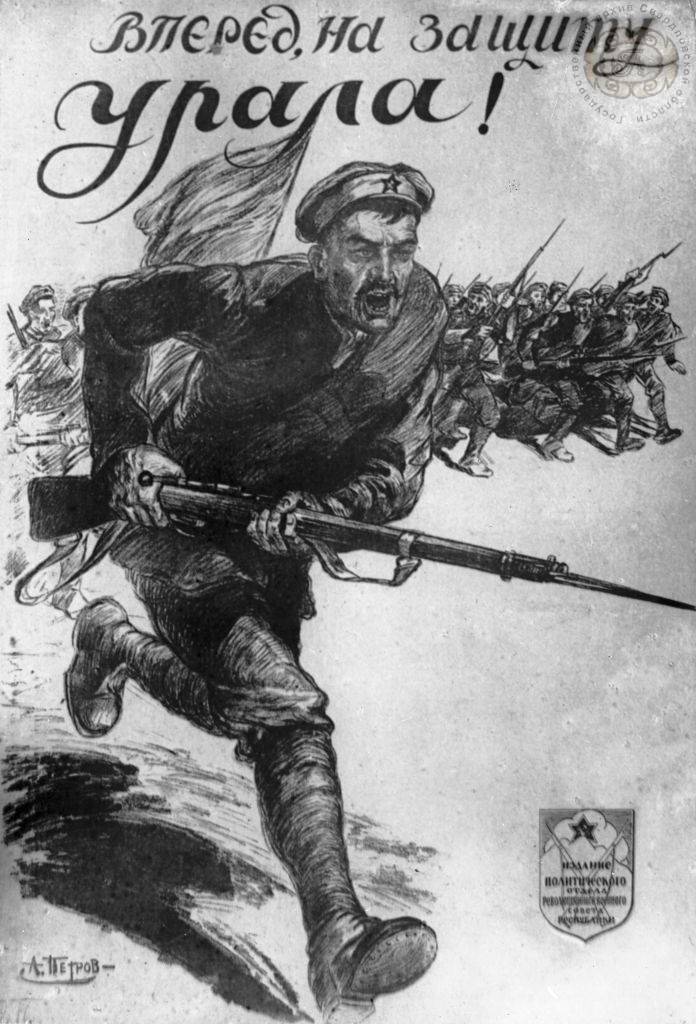
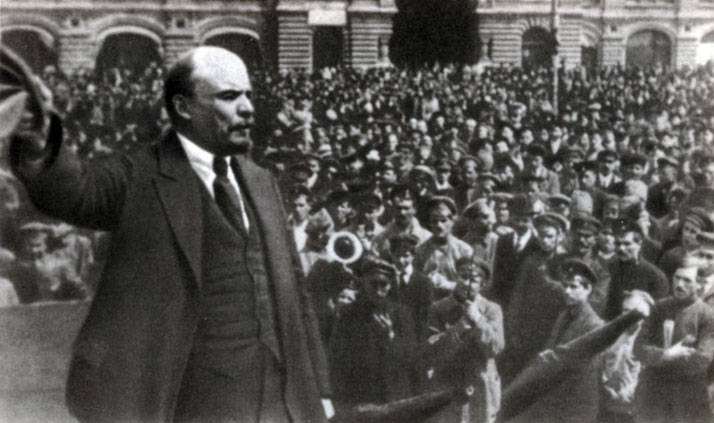
To be continued ...
- Alexander Samsonov
- Smoot. 1919 year
How the British created the Armed Forces of the South of Russia
How to restore Soviet power in Ukraine
How Petliurists led Little Russia to a complete catastrophe
How defeated Petliurism
Give the boundaries of 1772 of the year!
Battle for the North Caucasus. How to suppress the Terek Uprising
Battle for the North Caucasus. CH 2. December battle
Battle for the North Caucasus. CH 3. The January accident of the 11 Army
Battle for the North Caucasus. CH 4. How the 11 army died
Battle for the North Caucasus. CH 5. Capture of Kizlyar and the Terrible
Battle for the North Caucasus. CH 6. Furious assault of Vladikavkaz
How Georgia tried to seize Sochi
How the Whites crushed the Georgian invaders
The war of February and October as a confrontation between two civilization projects
How did the "Flight to the Volga"
How Kolchak's army broke through to the Volga
Catastrophe of the Don Cossacks
Verkhniyon uprising
How "Great Finland" planned to seize Petrograd
Information